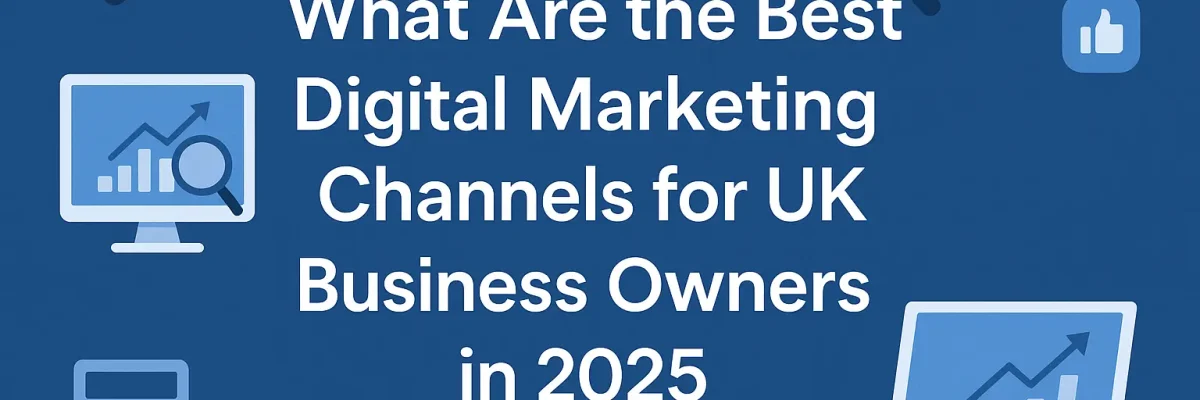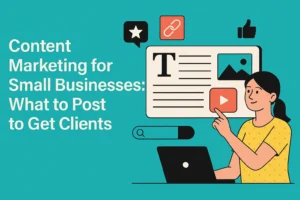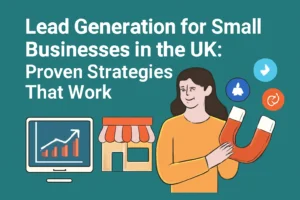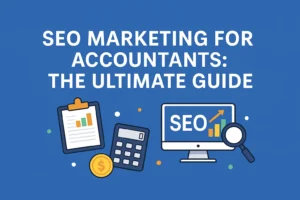If you are a UK business owner, 2025 brings both challenges and opportunities in the digital landscape. Consumer behaviour is evolving faster than ever, and traditional advertising is no longer enough to stay competitive. Whether you run a café in Manchester, an accounting firm in London, or an e-commerce store from home, your success depends on one key question — are you using the right digital marketing channels to reach your audience?
According to Statista, over 91% of UK adults now use the internet daily, and 80% of buyers research a business online before making a purchase. That means your visibility across the right platforms can directly influence your bottom line.
In this guide, we will explore the best digital marketing channels for UK business owners in 2025, along with strategies to make each one work — even if you’re working with a small budget or limited time.
If you’re new to digital marketing, start with my detailed guide on marketing a small business in the UK to understand the basics before diving deeper into this year’s most effective platforms.
Search Engine Optimisation (SEO) — Still the Most Reliable Long-Term Channel
Even in 2025, SEO remains the backbone of digital marketing for UK businesses. Search behaviour continues to grow, with over 46% of Google searches having local intent, meaning people are actively looking for nearby products or services. Whether you’re a London accountant or a Bristol café owner, ranking high in search results gives your business credibility and drives consistent, organic traffic.
Why SEO Matters for UK Businesses
Unlike paid ads, SEO works as a long-term investment. Once your website ranks well, you can generate leads without paying for every click. For example, a well-optimised service page for “digital marketing consultant London” or “accountants in Manchester” can bring in clients around the clock.
Key SEO Trends for 2025
- AI-powered search and SGE (Search Generative Experience): Google is now showing AI-generated answers at the top of results. That means you need to optimise your content for questions and conversational queries.
- Local SEO and map packs: Getting featured in Google’s Local Pack can triple your visibility for location-based searches.
- E-E-A-T signals: Expertise, Experience, Authoritativeness, and Trustworthiness are critical for ranking high, especially in competitive industries like finance, health, and marketing.
To strengthen your SEO, ensure your website is optimised for mobile, loads quickly, and includes relevant internal links. For example, linking your blog posts to your home page or contact page helps Google understand your site structure and builds authority.
If you want to explore step-by-step SEO tactics, check out my detailed posts in the blog section — they’re packed with strategies designed specifically for small UK businesses.
Social Media Marketing — Building Trust and Awareness in 2025
Social media remains one of the most powerful digital marketing channels for UK businesses — but in 2025, the way you use it matters more than ever. Gone are the days of posting generic images and hoping for engagement. Today, your social media presence must feel personal, educational, and authentic to connect with an audience that values transparency and real interactions.
According to Ofcom’s 2025 media report, over 86% of UK adults use at least one social media platform daily, with Instagram, TikTok, and LinkedIn dominating engagement. The opportunity to grow your brand is enormous — if you know where to focus your efforts.
1. Choose Platforms That Match Your Audience
Each platform serves a different purpose:
- LinkedIn: Ideal for B2B companies, consultants, and professional services.
- Instagram: Perfect for visually appealing products and personal branding.
- TikTok: Explosive growth for short-form videos, great for showing personality and behind-the-scenes content.
- Facebook: Still relevant for local community engagement and retargeting ads.
2. Video Content Rules in 2025
Video is no longer optional. Data from Wyzowl shows that 89% of consumers say videos influence their buying decisions. Even short clips showing your process, success stories, or quick tips can generate significant engagement.
3. Post Consistently and Engage Authentically
It’s better to post three valuable, meaningful posts per week than daily random updates. Use storytelling to share your client wins, lessons, or industry updates in a conversational tone. Engage with your followers by replying to comments and messages — genuine engagement boosts both trust and visibility.
If you need help creating an effective social media plan, visit the digital marketing services page for guidance on how I help UK businesses grow through strategic content creation and paid campaigns.
Paid Advertising — Balancing Outbound and Inbound Growth
While organic marketing builds trust and authority over time, paid advertising remains the quickest route to visibility. For UK business owners in 2025, the smartest approach is not choosing between Google Ads or social media ads — it’s learning how to use both strategically.
Paid advertising helps you attract the right customers, test campaigns quickly, and scale what works. But not all paid channels are equal — some drive immediate inbound leads, while others are better for brand awareness and retargeting.
1. Inbound Marketing (Google Search Ads)
Google Search Ads target people who are already looking for your services. When someone types “digital marketing consultant London” or “best hair salon in Birmingham,” they’re ready to take action. That’s why Google Ads usually generate higher conversion rates — but at a higher cost per click (CPC).
It’s the most intent-driven advertising channel. Businesses that invest in search ads typically see faster returns, especially when combined with strong landing pages and conversion tracking. If your goal is to land high-quality leads, Google Ads is the place to be.
You can learn more about setting up conversion-friendly campaigns in my digital marketing insights section, where I regularly share Google Ads strategies for UK businesses.
2. Outbound Marketing (Facebook, Instagram, and LinkedIn Ads)
Outbound ads are more about discovery and awareness. Platforms like Facebook, Instagram, and LinkedIn let you reach users who haven’t heard of your brand yet — ideal for nurturing them over time. These platforms offer cheaper clicks, more creative formats, and precise audience targeting.
They’re especially effective when paired with retargeting campaigns. For example, a user might see your Instagram ad, visit your site, and then get shown a Google ad later — creating multiple touchpoints that lead to a sale.
3. The Best Strategy — Combine Both
The winning formula for 2025 is combining inbound and outbound marketing:
- Use outbound ads to fill the top of your funnel and generate awareness.
- Use inbound ads to convert warm audiences into customers.
Think of outbound as introducing your brand to the right people, and inbound as closing the deal.
If you’d like help setting up a data-driven ad strategy tailored for your business, visit my contact page to book a free consultation.
Email and Content Marketing — Building Long-Term Relationships
In 2025, trust is currency. People buy from brands they know, like, and remember — and the best way to build that relationship is through email marketing and content creation. These two channels consistently deliver the highest return on investment for small businesses across the UK.
According to HubSpot’s 2025 Marketing Trends Report, email marketing still offers an average ROI of £36 for every £1 spent, while blogs and educational content drive over 70% more qualified leads compared to traditional outbound ads.
1. Content Marketing: Attract, Educate, Convert
Great content positions your business as an authority. Whether you’re a consultant, retailer, or service provider, producing valuable content helps potential clients trust you before they ever speak to you.
Start with simple content formats:
- Blog posts answering customer pain points
- Short videos explaining industry tips
- Case studies showing real success stories
- Guides and eBooks that solve specific problems
Consistency is more important than perfection. You don’t need to post daily — but you do need to post regularly and focus on quality. If you’re unsure where to start, check out my digital marketing blog for examples of how to turn content into conversion tools.
2. Email Marketing: Nurture and Retain
Once you’ve attracted visitors with content, use email to keep them engaged. Build an email list by offering free resources or exclusive insights. Then, send:
- Weekly newsletters with marketing or business tips
- Monthly updates about your services or offers
- Automated follow-ups for leads and new subscribers
Personalisation is key. Address readers by name and segment your emails by interest or location. Studies show personalised emails improve open rates by 26% and click-through rates by 41%.
Platforms like MailerLite, Brevo, or Mailchimp make email marketing accessible even for beginners. You can automate campaigns, track engagement, and integrate forms directly on your website.
For small business owners in the UK, combining content and email creates a loop of trust — you attract customers through helpful content and retain them with consistent communication.
If you want to learn how to set up high-performing content and email systems that actually convert, visit my digital marketing services page for more guidance.
Influencer and Partnership Marketing — The Human Touch in 2025
As digital audiences grow more selective and privacy-conscious, people increasingly rely on trust and recommendations to make purchasing decisions. In 2025, influencer and partnership marketing continue to rise as cost-effective ways for UK businesses to build credibility, reach new audiences, and strengthen brand reputation.
1. Influencer Marketing for UK Businesses
Influencer marketing is no longer limited to big brands with six-figure budgets. In fact, micro-influencers (those with under 50,000 followers) now deliver some of the highest engagement rates, according to Influencer Marketing Hub’s 2025 report.
For local UK businesses — from accountants to fitness studios — collaborating with niche influencers can create powerful word-of-mouth exposure.
Here’s how to do it effectively:
- Partner with creators who share your target audience’s interests.
- Focus on authenticity rather than follower count.
- Use clear calls-to-action (like “Book your consultation” or “Visit our store today”).
For example, a local beauty salon in London could collaborate with lifestyle creators who post relatable, organic content — not flashy ads. The goal is trust-driven storytelling that converts.
You can find inspiration in professionals such as Mitch The Taxman or Heath Hill Green, who show how personal branding and value-driven content can attract high-quality clients through transparency and expertise.
2. Partnership Marketing and Collaborations
Partnerships extend beyond influencers. You can form collaborations with complementary businesses to cross-promote services and share audiences. For example:
- A web design agency partnering with a content creator.
- A café collaborating with a nearby bakery.
- A digital marketer teaming up with an accountant for business growth workshops.
Partnership marketing helps you reach audiences you wouldn’t otherwise access — and it’s free, making it ideal for businesses on a budget.
Analytics and Automation — The Secret Weapons for Smarter Marketing in 2025
The best marketing isn’t just creative — it’s measurable. In 2025, UK business owners who succeed in digital marketing are those who rely on data and automation to make better decisions, reduce workload, and improve customer experience.
With so many platforms competing for attention, analytics helps you understand what’s working and what’s wasting your budget, while automation allows you to scale without burning out.
1. Why Analytics Matters
Analytics turn raw numbers into actionable insights. With tools like Google Analytics 4, Meta Insights, and LinkedIn Analytics, you can track exactly how people find and interact with your business online.
Here’s what to monitor regularly:
- Traffic sources: Which channels bring the most visitors?
- Conversion rates: Which campaigns actually lead to sales or enquiries?
- Engagement metrics: Which posts or videos your audience loves most.
Using this data, you can double down on what works and stop wasting time (and money) on what doesn’t. It’s the difference between guessing and growing.
2. Harnessing Automation Tools
Automation is your silent growth partner. It helps you maintain consistency across platforms, even when you’re too busy running your business.
Some tools that are transforming small business marketing in 2025 include:
- HubSpot & GoHighLevel – automate client follow-ups, lead nurturing, and pipelines.
- MailerLite & Brevo – schedule email campaigns and drip sequences.
- Buffer & Later – manage and schedule social posts automatically.
Automation ensures that your marketing never sleeps. From sending welcome emails to retargeting visitors with ads, these systems allow your business to stay visible 24/7 — even when you’re not online.
3. Data-Driven Decision Making
In today’s competitive market, every marketing pound should have a purpose. Combine automation with data insights to continually refine your marketing. For instance, if a Google Ads campaign drives more leads than social media ads, shift more budget there.
When combined, analytics and automation allow you to build a sustainable, scalable marketing engine that grows predictably — something every small business owner in the UK should aim for in 2025.
Conclusion and Call to Action
The digital marketing landscape for UK business owners in 2025 is more exciting — and more competitive — than ever. Success no longer comes from being everywhere; it comes from focusing on the right channels that align with your goals, audience, and budget.
Whether you’re running an accounting firm, an e-commerce store, or a local service business, your marketing strategy should combine long-term organic growth with smart paid campaigns.
Here’s a quick recap of the best digital marketing channels to prioritise in 2025:
- SEO for long-term traffic and credibility.
- Social media for brand awareness and engagement.
- Paid ads for immediate visibility and conversions.
- Email and content marketing for trust and retention.
- Influencer partnerships for authenticity and community reach.
- Analytics and automation for efficiency and smarter scaling.
The most successful UK businesses will be those that stay agile — testing, learning, and adapting continuously. You don’t need a massive budget to win online; you just need a clear plan, the right tools, and consistent effort.
If you’re ready to create a marketing strategy that works for your business, I’d love to help. I’ve spent years helping UK business owners grow their brands through data-driven marketing, social media strategy, and SEO optimisation.
Visit my homepage to learn more about my services, explore the blog section for free marketing insights, or get in touch today to discuss how we can elevate your business together.
Frequently Asked Questions
1. What are the best digital marketing channels for UK businesses in 2025?
Focus on a balanced mix of search engine optimisation, Google Search ads, Meta and LinkedIn ads, short-form video on Instagram and TikTok, email marketing, and local SEO with Google Business Profile. Add influencer or partnership marketing if your audience follows creators in your niche.
2. How should I choose the right channels for my business?
Start with your audience and goal. If you need leads fast, use Google Search ads and a conversion-ready landing page. If you need awareness, use Instagram, TikTok, or LinkedIn with short videos and carousels. Validate by running small tests and keep the winners.
3. Is SEO still worth it in 2025 with AI Overviews and changing search results?
Yes. SEO remains a top channel for compounding traffic. Optimise for questions, add clear answers, show expertise with case studies and reviews, and target local terms. Strong content can appear in organic results, AI answers, and the local map pack.
4. Google Ads or social ads, which should I prioritise?
Google Search ads capture existing demand and usually convert at a higher rate but clicks can be costly. Meta and LinkedIn ads are better for discovery and retargeting with cheaper clicks. Many UK businesses get the best results by combining both.
5. What social media platforms work best for B2B and B2C in the UK?
For B2B, lead with LinkedIn and support with YouTube and email. For B2C, use Instagram and TikTok for reach and engagement, then retarget with Meta ads and email. Facebook remains useful for local communities and events.
6. Does email marketing still work in 2025?
Email continues to deliver one of the best returns on spend for UK SMEs. Build a list with lead magnets, send helpful newsletters, and automate welcome and follow-up sequences. Personalise by segment to improve engagement.
7. How much should I budget for digital marketing channels?
A common starting point is five to ten percent of revenue. Allocate half to proven channels like search ads and email, and use the rest to test social ads, video, and influencers. Scale the channels with the lowest cost per qualified lead.
8. What role does video play among the best channels in 2025?
Short-form video dominates discovery and engagement on Instagram, TikTok, LinkedIn, and YouTube Shorts. Use simple how-tos, behind the scenes clips, and customer stories. Add captions and a clear call to action.
9. How do I measure which channels are working?
Track cost per lead, conversion rate, and pipeline value alongside traffic and engagement. Use Google Analytics 4 for attribution, platform dashboards for channel metrics, and simple UTM tags to keep your reporting accurate.
10. Are influencers worth it for small UK businesses?
Micro-influencers can be very effective when there is audience fit and a clear offer. Choose creators with real engagement, provide a trackable link or code, and repurpose their content across ads and email for extra reach.





